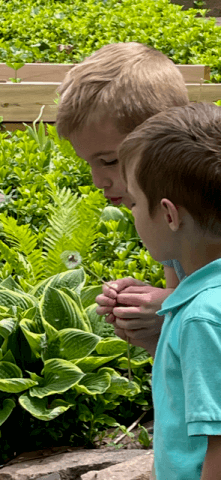How it is that the close 20-year friendship of two next-door neighbors ended over dandelions?
That is the question I pondered when I heard about the rift that had developed between two couples who live in a rural development near me.
The development is quite attractive; the lots are between one and two acres and all of the homes are uniquely designed, expensive, and well cared for. A small stream runs through the rear of the properties and the lawns are meticulously manicured, by either small outside lawn care companies or mostly by the home owners themselves.

Photo By Remi Muller on Unsplash.com
Clyde, who I got to know through a mutual friend, is extremely particular about his lawn, requiring bags and bags of weed killer, insect control and fertilizer. He has a big John Deer lawn tractor with all the attachments, and he isn’t afraid to use it! Consequently his yard looks like it could have come right out of Better Homes and Gardens.
The neighbors on his right side, Clara and Warren, built their home about the same time as Clyde, over 20 years earlier. The couples became friendly over the years and their children played together and remained good friends throughout high school. When Clyde’s wife was diagnosed with cancer, Clara provided loving care and support, including many meals, Clara was present just about daily during both the treatment and recovery stages, and the experience transformed them from friendly neighbors to close friends.
That is, up until the spring when a crop of bright yellow dandelions showed up on Clara’s yard.
Clyde’s reaction to the blossoms on Clara‘s lawn was strong and immediate. Although there was no formal agreement within the development, there was a very clear understanding: dandelions were strictly forbidden!
Clara had clearly broken an unspoken rule and Clyde began mobilizing the neighbors before he even considered confronting Clara. This created quite a bit of havoc in the neighborhood, with folks taking sides or feeling pressured to take sides, even if they thought the issue was fairly minor and not important enough to get worked up over. Although he was sure he was in the right, even Clyde was disturbed by the friction that had been created.
There are two questions I like to use when making a decision or unpacking what went wrong when the outcome of a decision isn’t what I wanted. I’ve used these two questions with clients for over two decades, and the process of answering them almost never fails to bring insight. Although the questions are mostly for evaluating your own decisions, you can also use them learn from others’ experiences and I wondered what applying them to Clyde’s situation might offer.
The first question is: why was the decision made?
Clyde’s belief that Clara needed to rid her lawn of dandelions seemed so obvious to him that it didn’t need explanation. Everyone knows dandelions are a weed that should be eliminated. You don’t need to justify something that everyone knows, right?
However, I have found that questioning unspoken rules and “givens” that “everyone knows” often results in some of the most revealing and surprising discoveries. Upon examination, many of these beliefs are nothing more than habit, tradition, or outdated holdovers from the past. Occasionally we may even find we’ve been deliberately sold a false belief to advance someone else’s agenda.
Why and how did we decide the dandelion blossom was anything less than beautiful? Why and how did we decide to label it as a weed that doesn’t belong in yards? Why and how did we decide we had to eradicate it with poisonous chemicals?
I reflected on my childhood and my own experiences with dandelions. I didn’t grow up with the same beliefs about this hardy little flower. Actually, many families in my small rural town eagerly anticipated its arrival and gathered it early before it began to bloom. Far from a pernicious weed, they considered dandelions a beneficial plant with several practical uses.
For starters, each spring we looked forward to a tasty dandelion salad covered with hot bacon dressing. To be honest, it was largely the homemade hot bacon dressing my mother used that made it such an amazing treat, but it still holds a fond place in my memories. Later in the season, several old-timers in our community would collect the blossoms and make dandelion wine. And then there were the contests we had as young children (or childish adults!) in trying to see who could blow the delicate seeds with their custom-designed parachutes the farthest! Dandelions have nothing but positive associations for me.
None of this is meant to say that my perspective on dandelions is the “right” one or “more” right than Clyde’s. It just shows that there is more than one way to look at them, and “everyone” doesn’t necessarily agree.
I don’t think Clyde’s attitude toward dandelions was the only unexamined belief that played into his reaction to Clara’s lawn. Based on all the work and money which he invested to present this perfect lawn, I expect Clara‘s decision caused a visceral reaction in him because a manicured lawn and living in a development with beautiful yards had some sort of emotional meaning to him. Obviously, whatever this perfect lawn represented to Clyde, consciously or unconsciously, it was being threatened!
Did having a “perfect” lawn mean he had everything in his life under control? Did living in an upscale development where all the yards were well-maintained indicate he was successful and had “made it” in life? Did he fear that once the neighbors bright yellow blossoms went to seed, they would end up on his own perfectly manicured lawn and “contaminate” it? Would the other neighbors begin complaining about him the same way he complained about Clara? Answering these questions might go a long way in revealing the real reasons behind Clyde’s actions.
After I’ve gone as far as I can with the answers to the first question, I move on to the second of my two questions. The second question is: what are the ramifications, both positive and negative, of this decision?
In this case, I wonder if Clyde considered that his actions could jeopardize his friendship with Clara and her family. If he had known, would he have thought a perfectly manicured lawn with no yellow blossoms in it was worth more than the friendship he had celebrated with his neighbor for over 20 years? I expect he also didn’t consider the long-term impact on the entire neighborhood of attempting to mobilize neighbors against Clara without having any understanding as to the reason for her decision.
If he had asked, he might have learned that Clara’s youngest son had begun having significant respiratory issues as well as skin rashes on his lower legs and feet, which the doctors were struggling to diagnose. Meanwhile their older daughter became very interested in ecology and the environment. As a high-school science project she decided to explore why there was less and less aquatic life in the small stream on their property. Her science teacher suggested she begin with a water sample. It turned out at least part of the problem was all the chemicals being applied to the lawns bordering the stream.

Photo by Phil Goodwin on Unsplash.com
At the same time a homeopathic doctor suggested they begin identifying and researching the various chemicals they were using both inside and outside their home. Clara’s research frightened her, especially for many of her cleaning products and also the various herbicides and pesticides they were applying to the lawn. Her son’s rashes seem to be directly related to the amount of time he spent outside during the spring and summer, often barefoot and in shorts or his swimming suit.
Based on the research and recommendations from two physicians and a very strong push from their concerned daughter, Clara began eliminating the chemicals both inside and outside her home. Fairly soon after they stopped applying the weed killer the yellow blossoms began showing up in her lawn!
But Clyde knew none of this because he never asked. Why are we afraid to talk directly to one another? Are we afraid to open ourselves up to dialogue because we may be challenged to dig deeper into the origins of our own beliefs and behaviors? What is so immobilizing and frightening about that? Or are we afraid of open conflict? Do the actions we take to avoid facing conflict directly unintentionally create more conflict?
I wonder if Clyde would have just asked Clara her reasoning when he saw the first bright yellow blossom appear on her lawn, if this unfortunate disaster would have ended differently? Or if he’d used the two questions before trying to mobilize the neighbors?
Your guess is as good as mine! As useful as the two questions are, they aren’t magic and can’t solve every problem. Sometimes you can still be blindsided by outcomes you didn’t foresee; sometimes we have to make difficult choices even in the face of negative outcomes.
Despite their limitations, though, I’ve found that when used regularly and rigorously, the two questions help raise our self-awareness and bring clarity and integrity to our decision making. Add them to your own toolbox and see if you don’t agree!
QUESTIONS FOR DEEPENING THE JOURNEY
- How often do you question your own motives? Do you willingly and honestly explore the reasons behind your actions and decisions?
- What unspoken or unexamined rules that you learned from your family, community, or culture are you living by that may not be serving you?
- What image do you try to project to others? Why do you want to be seen this way? What would happen if you stopped putting effort into maintaining the image?
- Do you regularly assess the short- and long-term impact of your decisions on your mental health, physical health, finances, relationships, community, and environment? Which of these areas are you most likely not to take into account, and why? Are there any other important considerations?
- Are there principles you think are worth risking relationships over? What are they? If you knew you would be cut off from a family member or friend for posting a political sign in your yard, would you still do it? Why or why not?
- Have you lost relationships over different beliefs? Were you the one who ended the relationship or were you cut off? How do you feel about what happened? Could things have been handled differently to preserve the relationship?
- Are you in the midst of any situations currently in which you can apply the two questions? What did you learn from your answers?
Banner photo by Neonbrand on Unsplash.com


Terry,
Your example with the dandelions is very thought provoking. On the surface I would initially feel self-pressure to upgrade my maintenance and try to reduce my dandelion problem. After all, what my property looks like can affect the value placed on everyone else’s property. However, it’s a two-way street. The civil conversation can lead to understanding what we do not know. We forget that part of our social interactions.
I’m told dandelions are misplaced flowers. Can a sincere conversation with neighbor help? Or is it too much trouble. Terry, Our politicians need some help…… Please!
Hummm, I should ask our son what he did. The last time we were there, he commented that his one neighbour had a lot of Danilions this year.
He thought that maybe he would just go and spot spray them for him.
The neighbour on the other side does not do anything with the yard, it is a jungle, good thing there is a high fence. Different strokes for different folks.
hope all is well Terry.
Terry,
Thank you for providing me the “nudge” I needed. These are questions that can help me move forward when I thought there was only retreat.
-Peggy Sue
My childhood memories of dandelions are the opposite! I hated dandelion salad, and it was my job to gather the greens which left a brown stain on my hands. Soap and water did not remove it, or the smell. The stains had to wear off. Consequently, I am one of those “no dandelion people.” But I dig them out( with gloves), no chemicals, and I would not dream of foisting my own dislike on my neighbors. I do dig out the ones that approach my lawn, which in NO ONE’s mind would ever qualify as manicured, just green!